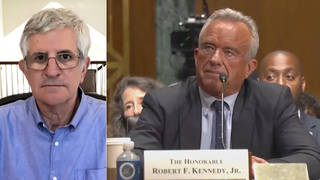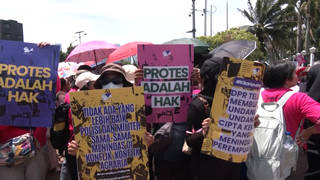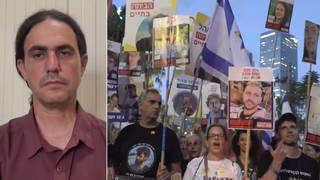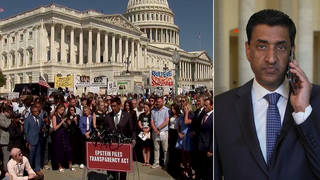
Authorities in Indonesia have launched a brutal crackdown on nationwide protests, sparked by outrage over generous housing allowances and other perks for politicians amid a deepening cost-of-living crisis. The protests were further inflamed after video showed a police vehicle running over a motorcycle taxi gig worker, who later died from his injuries. Security forces have detained more than 3,000 people since late August.
“The underlying issue is economic inequality,” Andreas Harsono, Indonesia researcher at Human Rights Watch, says of the protests. The taxi driver’s killing in particular “symbolized the difficulties that many Indonesians had faced” as many people have been forced to take on gig work for extra income.
Transcript
AMY GOODMAN: This is Democracy Now!, democracynow.org. I’m Amy Goodman.
We end today’s show in Indonesia, where at least seven people are dead, hundreds more have been injured, amidst a crackdown on anti-government protests that erupted in the capital Jakarta a week ago, before spreading across Indonesia. The uprising began with protests outside the parliament against salaries and housing allowances for lawmakers that are nearly 10 times the minimum wage in Jakarta. Protests spread nationwide after footage showed a paramilitary police unit using an armored vehicle to ram a group of protesters, killing a 21-year-old delivery driver. Protesters have since burned or ransacked buses, subways, and homes of several prominent politicians.
For more, we go to Jakarta, where we’re joined by Andreas Harsono, Indonesia researcher at Human Rights Watch, which has just published a report headlined “Indonesia: End Crackdown on Protesters, Arbitrary Detention: Investigate Excessive Use of Force, Tear Gas Against Demonstrators.”
Andreas, welcome to Democracy Now! Just lay out what developed this week. Start with the killing of the delivery driver and the response.
ANDREAS HARSONO: It started as a protest outside the parliament building because of the housing perk. It was on Monday last week. And then, on Thursday night last week, the protests became much bigger. Sixty-four labor unions joined the protests, also university students. But that evening, seven — around 7:20, a motorcycle taxi driver, you know, gig work, was hit, ran over by a police Barracuda vehicle. He died later in the hospital. But when he was hit, it was captured on video, and the video became viral, spreading all over Indonesia. In the next four days, there were protests — according to the Ministry of Home Affairs, more than 110 cities — repeat, 110, more than 110 cities — all over Indonesia. Almost 50 were burning, unfortunately, arson attack. Parliament building, police station were burned down, in Makassar, in Kediri, in Mataram, Lombok Island. So, it was pretty big.
And then President Prabowo and all party bosses met on Sunday. They agreed to cut the housing allowance, the controversial housing allowance. But also, Prabowo said that these protests border on treason and terrorism. Police arrested more than 3,000 people. And then there are still protest leaders being arrested until today, charged with either inciting violence or the internet law, inciting people to protest against the government. That is the latest one. Right now, today, Friday, there are still protests. Yesterday, Thursday, there are still protests, smaller, but they are still protesting, despite all the heavy presence of the military and the police in Jakarta and many other cities all over Indonesia.
AMY GOODMAN: What exactly is Human Rights Watch calling for right now, Andreas?
ANDREAS HARSONO: Basically, to end the excessive use of force. And Human Rights Watch also supported a United Nations calling the Indonesian government to have an independent investigation over the use of excessive force over the last one week in Indonesia.
AMY GOODMAN: I understand that the president, Prabowo Subianto, actually ended up going to, though he originally was canceling, his trip to China. The significance of this and Chinese President Xi Jinping expressing his appreciation and affirming support for Prabowo’s governance?
ANDREAS HARSONO: It is. It is. He was supposed to join the meeting in Shanghai on economic affairs. He canceled it. But he still joined the military parade in Beijing, meeting President Xi Jinping and other world leaders, including Vladimir Putin, Kim Jong-un of North Korea and many others.
AMY GOODMAN: And the significance of this? He clearly felt he could leave Indonesia. And where you think these protests and the crackdown, with, what, more than 3,000 people arrested, in addition to the deaths?
ANDREAS HARSONO: I think he felt confident that he can get the support of the military and the police to handle the political situations in Indonesia. He ordered to take strict measure against rioters, although he also promised freedom of expression, peaceful, can still be guaranteed in Indonesia.
AMY GOODMAN: If you could, finally, comment on the role of the economy, what’s happening right now in Indonesia? I mean, this clearly has tapped a chord in Indonesia. And if you see the protests continuing, or will the crackdown suppress?
ANDREAS HARSONO: The underlying issue is economic inequality. Like what you said, the perk given to the parliament makers — sorry, the lawmakers, are 10 times from the minimum wage in Indonesia, and that is only for the housing allowance, not to talk about salaries and other allowances. So, this is a grave concern. And we are still talking about regular lawmakers. We’re not talking about their bosses or the other elite members of Indonesia. People are angry because their taxes are being increased, property taxes, added-value taxes. But at the same time, they see that the political parties are more concerned about their lifestyle and also are more afraid to their party bosses, other than to be accountable to their respective constituencies. That is what make people angry.
Last but not the least, this motorcycle taxi driver’s death symbolized the difficulties that many Indonesians had faced, lost their job or need to supplement their income by working part-time, or sometimes full-time, by doing motorcycle work, or, to a lesser degree, also driving cars. And there are so many motorcycle taxi drivers all over Indonesia. They are so angry with the death of their colleague in Jakarta.
AMY GOODMAN: Andreas Harsono, I want to thank you so much for being with us, Indonesia researcher at Human Rights Watch. We’ll link to your new report, “Indonesia: End Crackdown on Protesters, Arbitrary Detention: Investigate Excessive Use of Force, Tear Gas Against Demonstrators.” Andreas was joining us from Jakarta, the capital of Indonesia.
That does it for our show. Democracy Now! is produced with Mike Burke, Renée Feltz, Deena Guzder, Messiah Rhodes, Nermeen Shaikh, María Taracena, Nicole Salazar, Sara Nasser, Charina Nadura, Sam Alcoff, Tey-Marie Astudillo, John Hamilton, Robby Karran, Hany Massoud, Safwat Nazzal. Our executive director is Julie Crosby. Special thanks to Becca Staley, Jon Randolph, Paul Powell, Mike Di Filippo, Miguel Nogueira. I’m Amy Goodman. Thanks for joining us.












Media Options